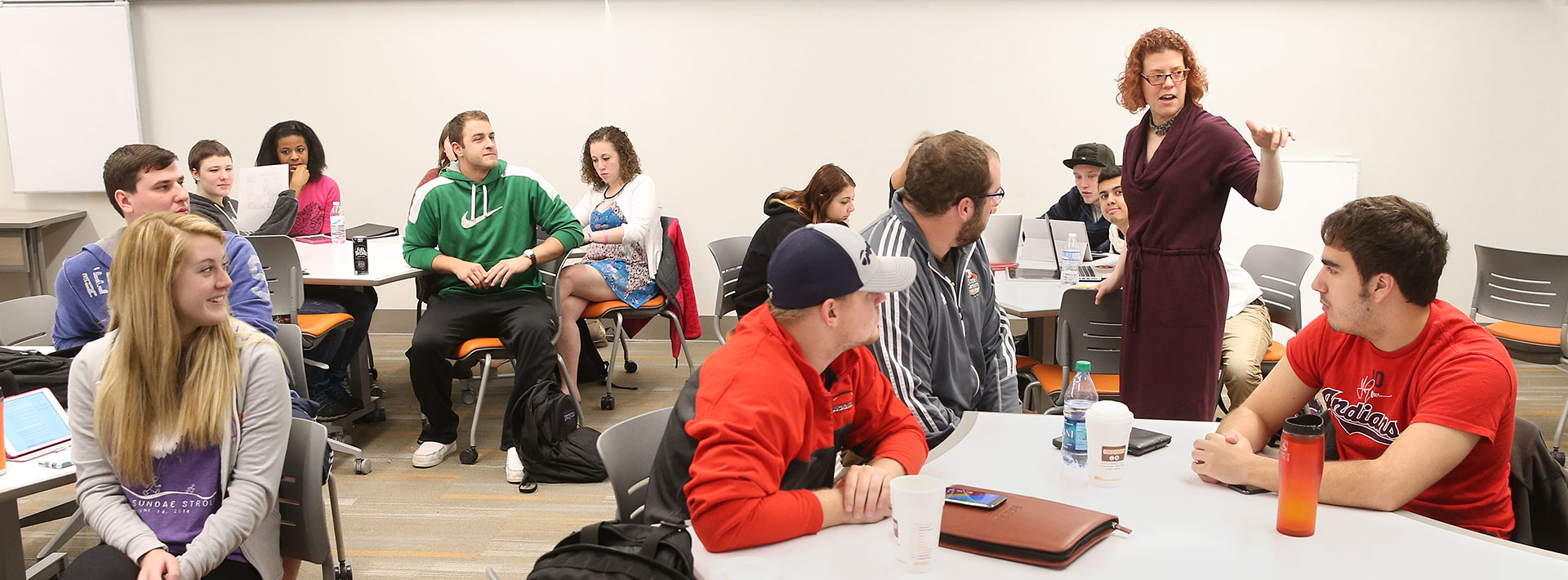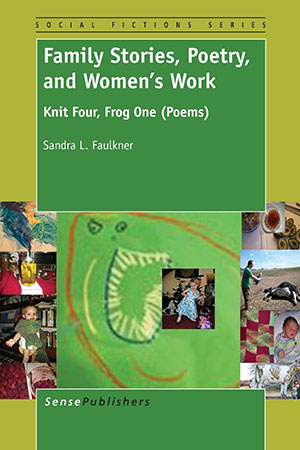National Poetry Month
Faulkner uses poetry to translate family tales

 There are many ways to investigate the world and our relationships within it. For Dr. Sandra Faulkner, a specialist in relational communication, poetry sometimes serves in a way that more conventional methods used by social scientists cannot.
There are many ways to investigate the world and our relationships within it. For Dr. Sandra Faulkner, a specialist in relational communication, poetry sometimes serves in a way that more conventional methods used by social scientists cannot.
Faulkner has recently published “Family Stories, Poetry and Women’s Work: Knit Four, Frog One (Poems).” The book calls equally on her roles as a social scientist, poet and teacher, and draws from her familial roles of child, mother and spouse. It can be read purely for the poetry, as a study of patterns of family communication, as a teaching guide for a number of courses, or a combination of all three.
“I made the specific decision to publish it with an academic rather than a literary press,” said Faulkner, director of the Women’s Gender and Sexuality Studies Program and a communication faculty member. She made the choice in part to affirm and demonstrate the “poetic inquiry” method, which melds art with social science. “The use of poetry allows a space to argue for the use of personal experience and critical work in the study of close relationships,” she writes.
Faulkner has also published a book, “Poetry as Method: Reporting Research through Verse,” presented on the topic and led workshops on poetic inquiry as a form of creative nonfiction.
Part of Sense Publishers’ Social Fictions Series, focused on the arts-based research movement, “Family Stories, Poetry and Women’s Work: Knit Four, Frog One (Poems)” is a “memoir in poetry,” Faulkner says in the preface. Using her own family and personal experience as its source and knitting as the unifying theme, she interweaves four generations, uncovering secrets, hidden connections and family culture. She explores in her poems the stories that families “tell or don’t tell” and why those stories often morph into other versions along the way. By contextualizing the identities of their subjects, Faulkner’s poems reveal how societal mores defined women’s sometimes stigmatized identities and shaped the very way in which they were spoken of by their families.
“I believe that the use of poetry to tell family stories reveals the emotions and the rhythms of family life and narration in ways the prose alone cannot,” Faulkner said. Themes emerge and can be analyzed through this poetic inquiry into family stories (the most basic of our lives), and patterns of communication are revealed.
As often happens, the experience of pregnancy and the birth of her daughter stirred memories and echoes of Faulkner’s own mother and grandmother and the family lineage of mothers, all of whom had a deep influence on her — even those she had not known but only heard about. Such is the potency of family stories and the way they create and maintain family, Faulkner said — a process often carried on primarily by women.
Faulkner is a serious poet who pays careful attention to the medium and the criteria that define it, with a special interest in poetry as “embodied experience.” Some reserved and coolly observing, others primal and sensual, the poems, though highly personal, reflect larger themes.
“Good poetry can trigger a different kind of thinking on the part of the reader, and resonates with our collective stories,” Faulkner said.
In addition to traditional poems, she also employs visual “collage poems” that bring together photos, illustrations, bits of letters and other memorabilia. The goal is not to create a historically accurate, chronological representation of her family history, but a weaving together of overlapping, generation-spanning family stories — just as these stories often obscure or re-invent the past.
The book contains exercises and examples for using poetry “as a pedagogical tool for the study of relational communication,” Faulkner said. She provides guidelines for those wishing to begin writing about relationships in verse and questions to use as prompts to elicit detail when researching with family members. Discussion questions about the book itself are included for faculty using the book in the classroom, and instructions on creating “found” or “transcribed” poetry as a form of research.
Faulkner has taught at BGSU since 2007. Her poems and images have appeared in numerous literary journals and she has published two chapbooks of poetry. She is also the author of the book “Inside Relationships: A Creative Casebook on Relational Communication,” and more than 20 of her articles have appeared in journals such as Qualitative Health Research and Qualitative Inquiry.
Updated: 12/02/2017 12:45AM
